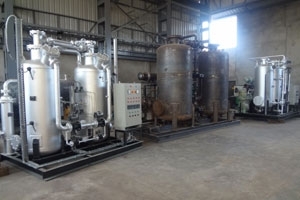Air Dryer
Ambient air usually contains a significant amount of moisture (water vapor). Most modern equipment operating on compressed air require this moisture to be removed in order to reduce system downtime due to rust, pipeline blockages and freezing problems. Moisture can be economically removed with the help of an Air Dryer. In addition, an air dryer assists in reducing the dew point of the compressed air, which prevents the water vapor from condensing in the air lines.
There are usually two versions of a regenerative desiccant dryer – single tower and twin tower. AtmosPower offers a twin tower dryer in which one tower dries the moist air coming in, while the other tower is regenerating under vacuum. AtmosPower’s dryers are systematically designed to operate on present cycle times to offer ease of use to the end user with the help of a simple start/stop button. In order to ensure the highest quality of equipment, Atmospower has an in-house vacuum system manufacturing division.

Advantages of Regenerative Desiccant Type Dryers include:
- Very low dew points can be achieved without potential freeze-up.
- Moderate cost of operation for the dew points achieved.
- Low Power Consumption
- Reduced system footprint
- Reduced noise levels due to elegant design.
- Low maintenance costs and increased system uptime.
- The dryer can be designed to operate pneumatically for remote, mobile or hazardous locations.
- Outlet air quality according to ISO standards
Different types of air dryers :
- Hoc Dryers
- Heatless Dryer
- Split flow type
- LP Dryer
Applications :
- Textile
- Painting
- Pharmaceutical industry
- Power Plants
- Hospitals
- Packaging
- Chemical refineries
- Food Processing
- Distilleries
- Sugar Mills
- Printing Press
- Synthetic Fiber Industry
- Chemical Process Industry
Heat of compression Air Dryer
A Heat of compression dryer is basically a regenerative desiccant based air dryer, which uses the heat generated during compression as its energy source for regenerating the saturated desiccant. It is a very reliable source of consistent large scale industrial dry air. The desiccant, is a highly porous material which adsorbs water molecules from the surrounding air. Some of the dry air is diverted to regenerate the media in the second tower
A HOC dryer is preferred because of its low electrical installation cost along with low power costs. The pressure drop of the system is very low, which also helps reduce its energy requirement. The dryer also uses recovered heat from the compressor to save on energy costs.
HOC Dryer – Key Features
| Inlet Air Temperature | 40°C to140°C |
| Operating Pressure | 5 to 10 Bar |
| Flow Rate (Capacity) | 1,000-10,000 Nm3/Hour |
| Dew Point Temperature | -40°C |
| Pressure Drop | 0.25 to 0.5 Bar |
Heatless Dryer
A heatless dryer works on the same principal as a standard desiccant based dryer, however no internal or external heaters are used. Instead of heating the air to dry the desiccant, more amount of air is purged into the tower. AtmosPower’s heatless dryers can achieve dew points of -40°F down to -100°F
Heatless Air Dryer – Key Features
| Inlet Air Temperature | 35 to 40°C Degrees Celsius |
| Operating Pressure | 7 – 150 Bar |
| Flow Rate (Capacity) | 40 – 10,000 Nm3/Hour |
| Dew Point Temperature | (-)40°C(As low as -70°C possible on request) |
| Pressure Drop | 0.25 to 0.5 Bar |
Internal Heated dryers
Heat reactivated regenerative desiccant dryers may have internal heat applied by heaters. In the internal type, steam or electricity may be used in heaters embedded in the desiccant bed. This reduces the amount of purge air required for regeneration to less than 10%. The purge air plus normal radiation is used to cool the desiccant bed after regeneration to prevent elevated air temperatures going downstream.
Internal Heated dryers – Key Features
| Inlet Air Temperature | Up to 120°C Degrees Celsius |
| Operating Pressure | 7-150 Bar |
| Flow Rate (Capacity) | 40 – 10,000 Nm3/Hour |
| Dew Point Temperature | -40°C (As low as -70°C possible on request) |
| Pressure Drop | 0.25 to 0.5 Bar |
Split flow type – Key Features
| Inlet Air Temperature | Up to 140°C Degrees Celsius |
| Operating Pressure | 7 – 10 Bar |
| Flow Rate (Capacity) | 1,000–10,000 Nm3/Hour |
| Dew Point Temperature | (-)40°C(As low as -70°C possible on request) |
| Pressure Drop | 0.25 to 0.5 Bar |
Low Pressure Dryer – Key Features
| Inlet Air Temperature | Up to 120°C Degrees Celsius |
| Operating Pressure | Up to 1 Bar |
| Flow Rate (Capacity) | 1,000–20,000 Nm3/Hour |
| Dew Point Temperature | (-)70°C |
| Pressure Drop | 0.05 Bar |

 Plot No.- C- 1, 39/3B & 39/8B, Phase- 3, Near Mazda Limited, Nana Chiloda Circle, G. I. D. C., Naroda, Ahmedabad – 382330, Gujarat, India.
Plot No.- C- 1, 39/3B & 39/8B, Phase- 3, Near Mazda Limited, Nana Chiloda Circle, G. I. D. C., Naroda, Ahmedabad – 382330, Gujarat, India.
 +(91) - 63587 68268
+(91) - 63587 68268